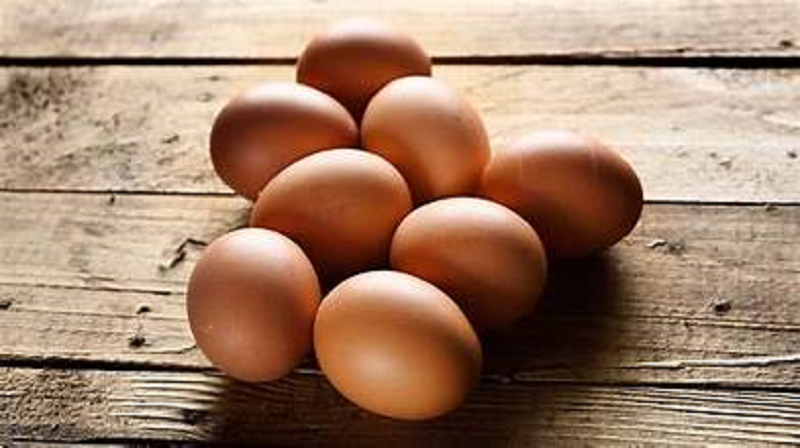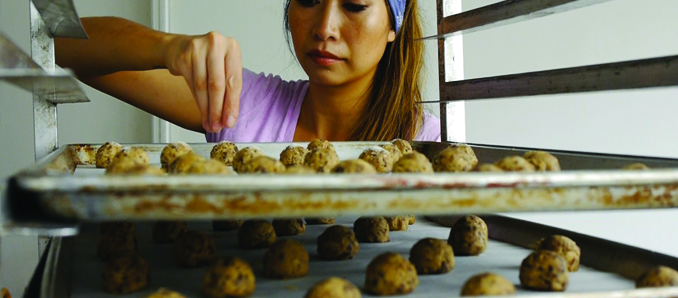The Humane League (THL), a global nonprofit working to end the abuse of animals raised for food, launches a consumer-led campaign urging Crumbl Cookies to adopt a 100% cage-free egg policy. A petition against Crumbl, the fastest-growing cookie chain in the U.S. with over 1,000 locations, already has more than 50,000 signatures from consumers asking Crumbl to stop sourcing eggs from hens raised in filthy, archaic cages. Crumbl was called out in the Cage-Free Eggsposé for lagging behind competitors like Krispy Kreme and Dairy Queen in more responsible egg sourcing.
Co-founded by cousins Jason McGowan and Sawyer Hemsley outside Salt Lake City, Utah, Crumbl sells an average of 1 million cookies per day, with their recipes relying on eggs from suffering caged hens. With the growing demand for more ethical products, now is the time for Crumbl to make a positive change for both its brand and animal welfare. By going 100% cage-free, Crumbl could improve the lives of an estimated 200,000 hens annually.
“Crumbl has attempted to build a fun and fresh image, but the reality behind its products is anything but,” says Emily Raap, Senior Campaigns Lead at The Humane League. “Crumbl’s refusal to address consumer concerns and use cage-free eggs in its recipes puts the corporation behind the times, especially when its competitors have already made the switch. It’s time for Crumbl to step up and show they care about more than just profits.”
Despite Crumbl’s viral popularity and rapid expansion, the company still uses eggs from hens confined to cruel cages—a practice increasingly condemned by consumers, with eleven U.S. states now banning the sale and/or production of eggs from hens raised in cages. With declining public trust and per-store profits down by 58%, The Humane League urges Crumbl to modernize its animal welfare practices and commit to sourcing 100% cage-free eggs.
The Humane League is amplifying voices from dissatisfied customers frustrated by Crumbl’s corporate practices, which include complaints about high prices, excessive sugar content, and dangerous ingredients. “More sugar doesn’t equal flavor,” reads one review, while another criticizes Crumbl as “a gimmick that will flame out” if they don’t make changes. Not only does the company seem to not care about animal welfare, but it also does not seem to care about consumers’ dietary restrictions to dairy, gluten, and more.
Increased consumer concern about the archaic conditions faced by chickens in cramped, wire cages—no bigger than the space of an iPad per bird with no room to even spread their wings—has led to the growing demand for cage-free eggs. Globally, The Humane League, alongside the Open Wing Alliance, has rallied consumers to encourage more than 2,620 food companies to pledge to eliminate cages from their egg supply chains. In the U.S. alone, more than 510 businesses are committed to source 100% cage-free eggs. As of September 2024, 41.7% of the egg-laying hens in the U.S. are raised in cage-free facilities. Despite this significant progress, over four billion hens worldwide still suffer in tiny, cramped cages that prevent them from engaging in crucial, natural behaviors. With eleven U.S. states now with laws banning the sale and/or production of eggs from hens raised in cages, “[restaurants] operating in these states must be prepared to comply with these laws to avoid civil fines, criminal animal cruelty charges, and in some cases, jail time.”
Join over 50,000 consumers in signing the petition against Crumbl Cookies and visit CrumblCruelty.com for more information about Crumbl’s refusal to source cage-free eggs. To learn more about the harms of raising hens in cages, visit EndCages.com.
About The Humane League
The Humane League is a global animal protection nonprofit that exists to end the abuse of animals raised for food. Since its founding in 2005, The Humane League has focused on effectively ending the worst abuses in factory farming, securing strong animal welfare commitments from major foodservice providers, restaurants, food manufacturers, and hospitality leaders around the world, changing the lives of billions of farm animals suffering every day.








